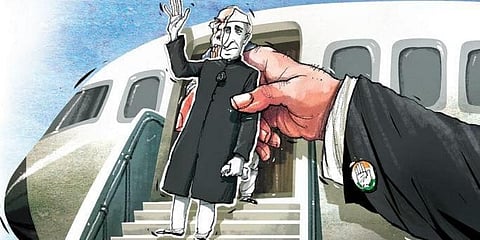

Prime Minister Narendra Modi was in the United States of America and the United Nations last week. He had multiple engagements and spoke many words in Washington and New York. He was in that country after a two-year gap, nine months since the exit of Donald Trump. The memories of the victory lap he had done with the former president in Houston in 2019, in his pale-yellow kurta and a trimmer haircut, has now been covered with mixed layers of emotion and ideas. In two years, the Covid pandemic that took charge of the world has transformed all people and nations without exception.
The words that Modi spoke this time in the US had a different ring and his stride was cautious. It appeared that diplomacy had returned to its traditional calm quarters without the hugs and the hoopla. Yet, there was a certain static in the whole dynamic affair. The establishment media and the liberal commentariat as well as the ruling party and the opposition did not budge from the way they approached the tour. They stuck to their prejudices and did not allow new contexts to challenge their well-formed habits.
The establishment circles were plain excited that Modi was getting into an airplane again. They behaved like they were in the 1970s and 1980s. That was when families at aerodromes noisily waved off an uncle who was on a short visit home from overseas, until he disappeared in the clouds. On the other hand, the liberal commentariat and opposition parties, particularly the Congress, behaved with a smug we-have-seen-it-all-before-you kind of cynicism and elitist snobbery. They could spot nothing new or correct in the prime minister.
The moment Modi posted a photo of his reading papers in the plane, they posted pictures of ‘their’ prime ministers performing similar acts decades ago. They wanted readers to decipher who was more genuine. Then, of course, there is always Jawaharlal Nehru to the rescue. His pictures of foreign tours with his daughter in tow and a swarm of crowds around him resurfaced and circulated to boredom. Are we supposed to keep admiring the aquiline nose of Nehru and his daughter? For the giant that Nehru was, to deploy his photos in the manner that they are, as a low-grade weapon to fight cheap political battles on social media, is nothing but a sham strategy devoid of imagination. They similarly used the image of Manmohan Singh to contrast the learning of Modi. That too violates the self-effacing nature and humility of Singh, who struggled to reach where he did. More importantly, he was a technocratic prime minister, not a political leader. The fact that he was not a political prime minister had shortchanged democracy and given rise to a Modi is not sufficiently recognised.
Seven years after Modi became prime minister, the reaction pattern of those who we may call liberal reactionaries (an oxymoron with the sweetest irony) has not changed. Why do they not get the simple fact that the more they counter Modi’s popularity with their elitism, they will only make him more entrenched among the masses? It is not just Modi that the Congress has treated like this. They also treated Morarji Desai, Charan Singh, Chandra Shekhar and H D Deve Gowda in a similar fashion—with derision. These prime ministers were not communal. They fought the good fight for secularism and the rural poor, but then why were they ill-treated? One should only read the parliamentary no-confidence debates against some of these prime ministers to get a sample. Like they correct the English spellings of Modi and his bhakts, they corrected the language of others too and giggled at their accent. They would have giggled at Manmohan Singh’s halting delivery too had he not earned his degrees from Oxford and Cambridge.
ALSO WATCH |
In his book, The Idea of India, Sunil Khilnani begins with a lie. He says H D Deve Gowda was ‘the first prime minister who spoke neither English nor Hindi’. True, Gowda did not speak the Queen’s English. But Khilnani was not aware that Gowda studied in the English medium in Holenarasipura and passed his engineering exams with a good score. Would it help if we say that Michael Sandal, who teaches at Harvard University, the haloed place of the elites, has written insightfully about such elitist traits in his recent book The Tyranny of Merit? It is important to fight ideological fights, but they are fought differently. There is something to learn from the Left here. Parliamentary and other debates in which an E M S Namboodiripad, Harkishen Singh Surjeet, A B Bardhan, Somnath Chatterjee, Jyoti Basu, Jyotirmoy Basu, Inderjit Gupta, Sitaram Yechury, D Raja, Prakash Karat, Subhashini Ali, Pinarayi Vijayan or Brinda Karat among others participated or participate in have a different ring of dignity to them.
While there is nothing much to write about Modi’s cheer squads, there is a classic question to the ones who advertise themselves as the thinking type. When Modi was in the US and UN, he spoke about the climate crisis, democracy, global values, science-based learning, rational and progressive thinking as against regressive thinking, and vaccines, among other things. He quoted from Chanakya, M K Gandhi and Rabindranath Tagore. He spoke about all this not in English but Hindi, a language he is in full control of. Now, should he be welcomed and encouraged, whatever the contradictions there may be in his home agenda, for embracing a harmonious universalist theme, or should we tie him up obsessively to the past? Would the encouragement help bridge the gap between the walk and the talk? Shouldn’t we be happy when he borrows liberal parlance? Should we mock him by asking why he did not quote M S Golwalkar and Vinayak Savarkar? Assume Modi’s was all pretense, but do pretenses not grow on people?
Sugata Srinivasaraju
Senior journalist and author
(sugata@sugataraju.in)